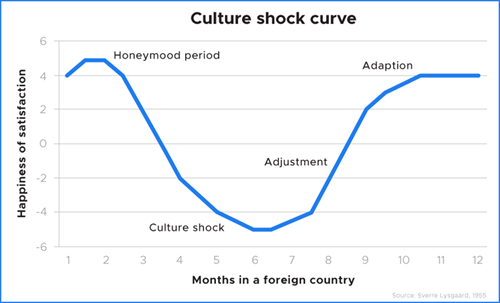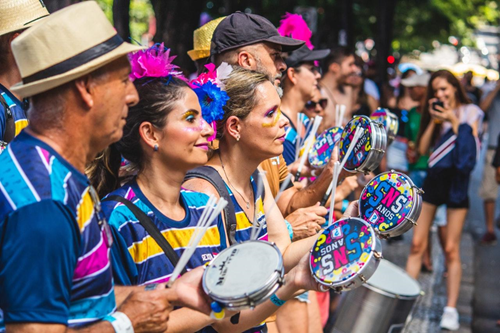Moving overseas can be a thrilling experience. You can expect to find yourself exploring unfamiliar territory, meeting new people and trying different things.
However, for some, it can be a difficult and overwhelming time, particularly if you’re a first-time expat or international student who has never lived abroad before.
While some are able to adapt successfully, for others it can take time to acquaint themselves with the culture of a new country. If you’re one of the latter, this guide will teach you everything you need to know about culture shock, its different stages, and how to handle it.
What is Culture Shock?
Culture shock is the feeling of disorientation experienced by someone when they are suddenly subjected to an unfamiliar culture and way of life. It can be caused by a range of things, both big and small, such as unfamiliar greetings and hand gestures, strange food, difficult language barriers, getting lost in a new city or making a cultural faux pas because you didn’t know the local custom.
This unfamiliarity can lead to symptoms such as confusion, anxiety, frustration, loneliness, and homesickness. It can even lead to physical symptoms such as insomnia as a result of time zone changes, or colds and stomach bugs due to unfamiliar foods and bacteria.
Culture Shock Stages
Many researchers have written about culture shock and it is widely recognised that there are four different stages to the process – honeymoon, negotiation, adjustment and adaptation. Read on to find out more about each stage.

Source – Sverre Lysgaard, 1955
1. Honeymoon Stage
The Honeymoon Stage is the first stage of culture shock, and it can often last for several weeks or even months. This is the euphoric phase when you’re fascinated by all the exciting and different aspects of your new life – from the sights and smells to the pace of life and cultural habits.
During this phase, you’re quick to identify similarities between the new culture and your own, and you find the locals hospitable and friendly. You may even find things that would be a nuisance back home, such as a traffic jam, amusing and charming in your new location.
However, unfortunately, the honeymoon period must always come to an end.
2. Negotiation Stage
Next is the negotiation stage which is characterised by frustration and anxiety. This usually hits around the three-month mark, although it can be earlier for some individuals. As the excitement gradually disappears you are continually faced with difficulties or uncomfortable situations that may offend or make you feel disconnected.
The simplest of things may set you off. Maybe you can’t remember the way back to your new home because the street signs are confusing, or you can’t fathom how and what to order in a restaurant.
At this point, you also start to miss your friends and family back home and idealise the life you had there. This is often when physical symptoms can appear and you may experience minor health ailments as a result of the transition.
You may not find the locals so friendly anymore and you express feelings of confusion, discontent, sadness, and even anger.
3. Adjustment Stage
Thankfully this phase will come to an end as you begin to move into the adjustment phase, usually at around six to twelve months. This is the stage where life gradually starts to get better and routine sets in.
You begin to get your bearings and become more familiar with the local way of life, food and customs. By this point you may have made a few friends or learnt some of the languages, helping you to adjust and better understand the local culture.
You may still experience some difficulties at this stage, but you’re now able to handle them in a more rational and measured way.
4. Adaptation Stage
Finally, you reach the adaptation stage, sometimes know as the bicultural stage. You now feel comfortable in your new country and better integrated – you have successfully adapted to your new way of life.
You no longer feel isolated and lonely and are used to your new daily activities and friends. While you may never get back to the heightened euphoria you felt during the honeymoon stage, you’ve now gained a strong sense of belonging and finally feel at home in your new environment.
5. Re-entry Shock
It’s also important to note that there can be the fifth stage of this process. Re-entry or reverse culture shock can happen once you return home after living abroad for an extended period.
You may quickly realise that things are very different from when you left, and feel like you no longer belong as your family, friends and even your home town have changed and moved on without you.
You might find yourself saddened that your newly learned customs and tradition are not applicable in your home country, and you have to go through the whole process of adjustment and adaptation all over again!
How to Deal With Culture Shock

Like it or not, culture shock is an intrinsic part of living abroad so it’s best to acknowledge the inevitability of it and prepare yourself to adapt as quickly as possible.
Here are some ways you can best deal with culture shock:
1. Remember that it’s normal
Remember that most expats go through this. Culture shock is not a sign that anything is wrong. It’s part of the expatriate experience and eventually, you will be able to look back on this process with fond memories.
You’ve been given the opportunity to live in a different part of the world and experience different cultures and tradition – both the good and the bad are all part of the adventure.
2. Make your own space
Travelling light is good but leave a space in your suitcase for a few luxuries that will help you to personalise your new home.
Your favourite cushion or a framed picture can make a big difference to your space and help you feel at home more quickly. Build yourself a safe haven that you can come back to when it all gets a bit too much.
3. Keep an open mind
One of the most effective ways of dealing with culture shock is to keep an open mind and welcome the surprising experiences as they arise.
Commit to saying yes as much as possible. Accept invitations to events, eat strange food, offer to help out a new friend, and discover your new home’s cultures and traditions for yourself. Of course, you should also use common sense and be sure to stay safe, healthy and not push yourself too hard.
4. Explore
Try to avoid hiding away too much. Get out there and explore.
Feel free to live the tourist life. A great way of doing this is via public transport. Ride around the city with your camera or commit to visiting a new place every day, even if it’s simply a quick turn down a new street on your way home.
You might even discover a faster route to get to work, find a new hangout where you can relax, or snap a fantastic photo to share with friends and family back home.
5. Find something you really love
Find something you love to do in your new home. It could be anything from wandering the museum, to sipping coffee in the park, or hiking the mountains. That way when things get difficult, you can go back to that experience or place to cheer you up and remind you why you came to this country in the first place.
6. Set yourself a project
Find yourself a project. Whether that be learning how to prepare a local dish, practising the steps of traditional dance, or memorising some useful phrases in the local language – keep yourself busy with something new and exciting.
Having a project to work on will give you a sense of achievement and prevent you from dwelling too much on your culture shock.
Conclusion
Remember that culture shock is an essential part of the experience of living overseas.
By accepting it for what it is and finding ways to handle it, you can prevent culture shock from keeping you down in the dumps and move forward with enjoying life in your new location.


